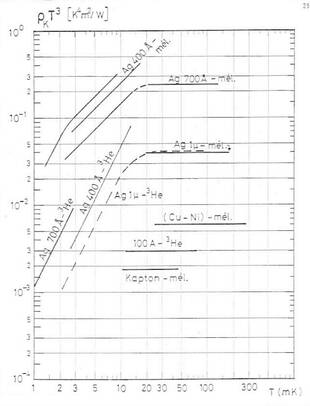wiki:silver_powders
Table of Contents
Silver Powders
Kapitza Resistance
- The Kapitza thermal resistance between 3He or mixtures and sintered silver powders is a particularly important parameter for the design of low temperature heat exchangers. The minimum grain size for mixtures is about 1000Å, because 3He atoms are expelled from small pores, filled essentially by 4He. Note that in the concentrated side of a dilution refrigerator, a 4He film coats the surfaces, and therefore the Kapitza resistance is that of mixtures, and not that of pure 3He. Finer grain powders can be used in cells containing very pure 3He.
- The values shown in the graph are typical, but it must be kept in mind that the properties of powders are known to vay, even from batch to batch. Tests must be made to determine the actual Kapitza resistance with any particular powder. Some examples are given in the references below.
- Curves for mixtures correspond to the Kapitza resistance measured between sintered silver powder heat exchangers and mixtures, either indirectly through the performance of heat exchangers (G. Frossati), or directly in cells containing helium mixture (H. Godfrin).
- Resistance between 1µm silver powders and pure 3He: Andres and Sprenger (1975)
- Resistance between Epibond 100A and and mixtures: Anderson et al. (1961)
- Resistance between Kapton and and mixtures: B. Hébral, PhD Thesis, Grenoble (1978)
- Resistance between 700Å silver powders and pure 3He: measurements by Ahonen, Lounasmaa and Veuro (1978) and H. Godfrin (PhD Thesis, 1981).
Source: H. Godfrin, PhD Thesis, 1981. Note: in the graph, “mél” stands for mixtures (mélange in French).
Articles on Silver Powders
The following articles provide information on sintered silver powders and their application to heat exchangers
- Effect of boundary condition on Kapitza resistance between superfluid 3He-B and sintered metal, S. Autti, A. M. Guénault, A. Jennings, R. P. Haley, G. R. Pickett, R. Schanen, V. Tsepelin, J. Vonka, D. E. Zmeev, and A. A. Soldatov, Phys. Rev. B 102, 064508 (2020) https://doi.org/10.1103/PhysRevB.102.064508, ArXiv: https://arxiv.org/abs/2005.05838
- Thermal boundary resistance between liquid helium and silver sinter at low temperatures, A. Voncken, D. Riese, L. Roobol, R. König, F. Pobell, J. of Low Temp. Phys. 105, pages 93–112 (1996), https://doi.org/10.1007/BF00754629
- A Geometry dependent thermal resistance between a saturated dilute 3He - 4He Solution and sintered silver powder, D.J. Cousins, A.M. Guénault, G.R. Pickett, P. Thibault, R.P. Turner, E.N. Smith, C. Bäuerle, Yu.M. Bunkov, S.N. Fisher, H. Godfrin, J. of Low temp. Phys. 101, 259 (1995), https://doi.org/10.1007/BF00754586
- T−3 Temperature Dependence and a Length Scale for the Thermal Boundary Resistance between a Saturated Dilute He3-He4 Solution and Sintered Silver, Cousins, D. & Fisher, S. & Guénault, Anthony & Pickett, George & Smith, E. & Turner, R. Phys. Rev. Lett. 73, 2583-2586 (1994), https://doi.org/10.1103/PhysRevLett.73.2583.
- New silver powders with large surface area as heat exchanger materials (C8-powder), W.Itoh, A.Sawada, A.Shinozaki, Y. Inada, Cryogenics, 31, 453 (1991), https://doi.org/10.1016/0011-2275(91)90207-D
- A recipe for sintering submicron silver powders, V. Keith and M.G. Ward, Cryogenics, 24, 249 (1984), https://doi.org/10.1016/0011-2275(84)90151-6
- Properties of sintered silver powders and their application in heat exchangers at millikelvin temperatures, H. Franco, J. Bossy, H. Godfrin, Cryogenics, 24, 477 (1084) https://doi.org/10.1016/0011-2275(84)90006-7
- Properties of sintered-silver heat exchangers, P.A. Busch, S.P. Cheston, D.S. Greywall, Cryogenics, 24, 445 (1984) https://doi.org/10.1016/0011-2275(84)90021-3,https://ur.booksc.eu/book/2080630/728d06
- Properties of sintered submicron copper and silver powders and their relation to low temperature heat exchangers, R. J. Robertson, F. Guillon, J. P. Harrison, Can. J. of Phys. 61, (1983), https://doi.org/10.1139/P83-023
wiki/silver_powders.txt · Last modified: 2022/02/04 13:20 by henri.godfrin@neel.cnrs.fr


